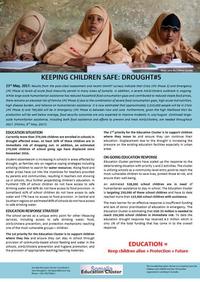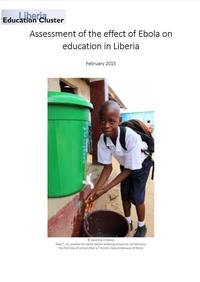Resources
Request support on coordination, information management, capacity development or other education in emergencies areas.
Demande de soutien en coordination, gestion de l’information, développement des capacités et autres domaines de l'éducation en situation d'urgence.
لطلب الدعم في مجال التنسيق ، إدارة المعلومات ، تنمية القدرات أو في اي مجال من مجالات التعليم في مناطق الطوارئ
Solicitar apoyo en coordinación, gestión de la información, desarrollo de capacidades u otra áreas en educación en emergencias.
Featured Resources
below you can find selected tools

COVID-19 Resources
View resources to support education in emergencies coordination during the COVID-19 pandemic.

Guidance on Education Cluster Co-Leadership Arrangements at the Country Level
Indicative Guidance for the establishment and management of co-leadership arrangements at the country level.

Inter-agency Network for Education in Emergencies
For technical education in emergencies resources, please visit the INEE website.
Review of Localisation in Coordination in Somalia –Education Cluster
This report provides a summary of the observations, analyses and recommendations that were compiled by the Global CP AoR, Global Education Cluster and Somalia Education Cluster.
- Coordination: Coordination, Knowledge Mangement, Leadership
- Emergency: Conflict, Complex, Drought, Floods
- Technical Areas: Localisation, Protection
Kenya Education Cluster Education in Emergencies Comprehensive Assessment Tool
The purpose of this tool is to collect information on the effects of disasters (armed conflicts, drought, fire, floods, winds, landslides, human wildlife conflicts, etc.) on the provision of education services in affected areas. The information gathered will enable stakeholders to formulate…
- Coordination: Needs Assessment
- Emergency: Conflict, Drought, Floods
- HPC: Needs Assessment & Analysis
- Communicaiton: Communication Materials
- Coordination: Advocacy
- Emergency: Drought
- HPC: Resource Mobilisation
- Technical Areas: Protection
Global Education Cluster Strategy Package Evaluation and Lessons Learned Survey
The Global Education Cluster developed the Strategy Package To support country Education Clusters in the Strategy Development process. We would like to get your feedback on the Strategy Package –the Strategy Guide and accompanying tools, templates and resources –and also capture any lessons learned…
- Emergency: Conflict, Drought, Displacement
- HPC: Operational Peer Review and Evaluation, Strategic Planning
Cash and Education in Somalia
Cash programming has become a significant part of the current drought response in Somalia. Conditional and unconditional cash grants or vouchers, that are either restricted or unrestricted, are being used by a large variety of partners for food or multi-purpose transfers to affected people. With…
- Coordination: Inter-Sector Coordination
- Emergency: Drought
- HPC: Implementation & Monitoring
Ethiopia Secondary Data Review Report 2016
Ethiopia has recorded one of the fastest growing economies (at an average 10.5%) in the Sub-Saharan Africa in the last 10 years. However, it ranks 174 of 188 countries on the 2015 Human Development Index implying a long way to go. The Ethiopia education system is vulnerable to both natural…
- Coordination: Needs Assessment, Information Management
- Emergency: Conflict, Complex, Drought, Floods, Displacement
- HPC: Needs Assessment & Analysis
Ethiopia Education Cluster EDUCATION IN EMERGENCY 2016/17 RESPONSE STRATEGY
The Federal MOEis leading the Education Cluster with UNICEF and Save the Children to respond to the need of Education in Emergency.In response to the recent crisis, the EEC has been officially reactivated in January 2016 in order to be able to coordinate partners and respond to the crisis. This is…
- Coordination: Cluster Strategy
- Emergency: Conflict, Complex, Drought, Floods
- HPC: Strategic Planning
Liberia Education Cluster Strategic Plan 2015
West Africa has faced an outbreak of the Ebola Virus Disease (Ebola)since March of 2014. While Ebola has been declared an international public health emergency, it is clear that Ebola has implications far beyond the health sector. The Education Cluster Strategic Recovery Plan Was developed through…
- Coordination: Cluster Strategy
- Emergency: Epidemic
- HPC: Strategic Planning
- Coordination: Information Management
- Emergency: Epidemic
- HPC: Implementation & Monitoring
Liberia Education Cluster Ebola Assessment Report
Following the Ebola outbreak, schools in Liberia were ordered closed in July 2014. They remained closed for more than 7 months, until the start of the school year 2014/2015, from 16 February onwards. In order to determine the impact of Ebola on education in Liberia, the Ministry of Education and…
- Coordination: Needs Assessment
- Emergency: Epidemic
- HPC: Needs Assessment & Analysis
Filter results
Communication(selected )
Coordination(selected )
Country(selected )
Emergency(selected )
Humanitarian Programme Cycle(selected )
Language(selected )
Publication Date(selected )
Publisher(selected )
Resource Type(selected )
Technical Areas(selected )
Can’t find what you’re looking for?
Contact your relevant language Help Desk










